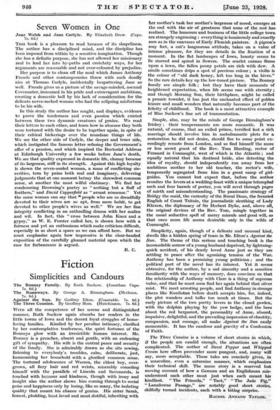Fiction
Simplicities and Candours
The Bonney Family. By Ruth Suckow. (Jonathan Cape. - 7s. 6d.) Wan all the competence of her serene and distinguished manner, Ruth Suckew again absorbs her readers in the little towns of Iowa and the decent loyal struggles of home- loving families. Kindled by her peculiar intimacy, clarified by her contemplative tenderness, the quiet fortunes of the Bonneys glow with an irresistible human interest. Mr. Bonney is a preacher, absent and gentle, with an endearing gift of sympathy. His wife is the central peace and security of the family. She is admirably drawn as she sits sewing, listening to everybody's troubles, calm, deliberate, just, harmonizing her household with a glorified common sense. The tortured adolescence of Warren, the eldest boy, over- grown, all fiery hair and red wrists, miserably consoling himself " with the parallels of Lincoln and Savonarola, is touched with humour and kindness, though with irony and insight also the author shows him coming through to social poise and happiness only by losing, like so many, the isolating quality that meant his chance of genius. His sister Sarah, honest, plodding, least loved and most dutiful, inheriting with
her mother's task her mother's largeness of mood, emerges at the end with the air of greatness that none of the rest has realized. The humburs and business of the little college town are strangely engrossing : everything is luminously and exactly seen as in the canvases of Early Flemish painters. A pigeon's rosy feet, a cat's languorous attitude, takes on a value of intense pleasure, for they are details in the fixation of .a moment. In the flat landscapes of Iowa, beauty seems to lie starred and spired in flowers. The scarlet cannas flame upon a lawn, the fallen peony petals are rich with dew. A simile sometimes drips a spot of precious colour ; a violin is the colour of "old dark honey, left too long in the hives." So the rare details key up the low-toned picture. The Bonney family are simple folk ; but they have their moments of
heightened expectation, when life seems one with eternity ; and though Morning Sun, their birthplace, might be called a prosaic townlet, it has just the enchanted effect of golden leisure and small wonders that naturally becomes part of the felicity of childhood. The book is a most attractive example of Miss Suckow's fine art of transmutation.
Simple, also, may be the minds of George Birmingham's Trishry ; their' temperaments are more romantic. It was natural, of course, that an exiled prince, terrified lest a rich marriage should involve him in melodramatic plots for a restoration he did not desire, should flee to some point ex- ceedingly remote from London, and so find himself the more or less secret guest of the Rev. Tom Harding, rector of Fennard in Connaught, west of which is the Atlantic ; and equally natural that his destined bride, also detesting the idea of royalty, should independently run away from her ambitious mother to her old teacher, the rector's wife, temporarily segregated from him in a great camp of girl- guides. You cannot but expect that, before the author reunites the lovers at a wedding-feast witha unique triumphal arch and four barrels of porter, you will revel through pages of mirth and misunderstanding. The passionate strategy of Bridgy the maid, the curiosity of the Rural Dean, the frenzied English of Count Tzitzin, the journalistic sleuthing of Lady Klaxon, the diplomacy of Sir Herbert Dyke, and, above all, the original devices of the Rev. Tom, mingle together in the usual seductive spell of merry misrule and good will, so that once more life seems desirable only in the wilds of Connaught.
Simplicity, again, though of a delicate and unusual kind,
dwells like a hidden spring of tears in Mr. Elton's Against the Sun. The theme of this serious and touching book is the inconsolable sorrow of a young husband deprived, by lightning-
quick accident, of his dearly loved Anne just as they are settling to peace after the agonizing tension of the War. Anthony has been a promising young politician ; and the political part of the novel has its interest. Yet it seems obtrusive, for the author, by a sad sincerity and a sensitive familiarity with the ways of memory, does convince us that the relationship of Anthony with Clare is a thing of supreme value, and that he must soon find her again behind that silver mist. We meet arresting people, and find Anthony in strange places like Kurdistan before death accepts him, for, indeed, the plot wanders and talks too much at times. But the early picture of the two pretty lovers in the closed garden, with the dolphin playing by the yew hedge, and the bees about the red bergamot, the personality of Anne, absurd, impulsive, delightful, and the prevailing impression of chastity, compassion, and courage, all make Against the Sun easily memorable. It has the candour and gravity of a Confession of Faith.
The Three Cousins is a volume of short stories in which, if the people are candid enough, the situations are often complicated. The author of Sweet Pepper and Whipped Cream here offers provender more pungent, and, many will say, more acceptable. These tales are concisely given, in a masculine, even a saturnine manner, which emphasizes their technical skill. The name story is a reserved but moving account of how a German and an Englishman mis- understood each other most just when each meant his kindliest. " The Primula," " Tact," " The Jade Pig," " Lansdowne Passage," are notably good short stories, skilfully turned incidents, each with a biting surprise.. - RAcann ANNAND TAYLOR.






























 Previous page
Previous page